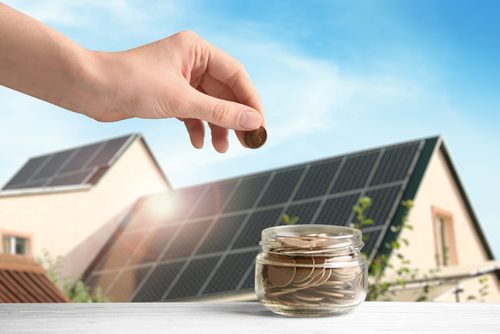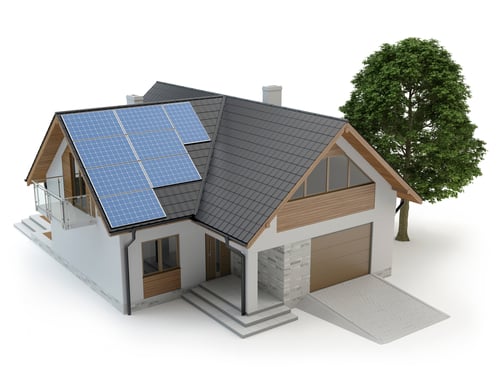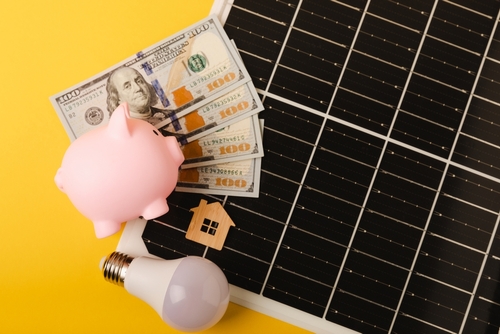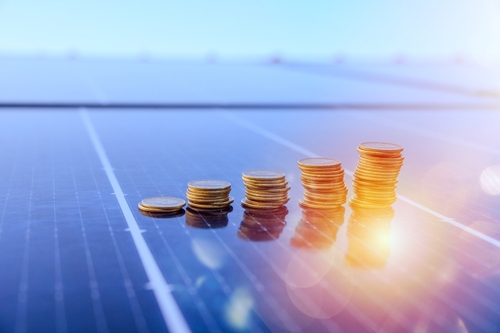With rising electric costs and initiatives to create sustainable energy, more people are considering the benefits of solar power. Residential solar power can be an excellent way to generate power for your rental properties for several reasons. After all, who doesn’t want to be more energy-efficient? However, considering the high costs and weather dependence, weighing the pros and cons is important. In today’s article, we’ll review how it works, the pros and cons, and the costs of residential solar power. So, read along to learn more.

Contents of This Article:
- What is Residential Solar Power?
- Cost of Residential Solar Power
- Pros and Cons of Residential Solar Power
- Should You Invest in Residential Solar Power?
- Ensure High-Quality Property Maintenance
What Is Residential Solar Power?
Whether you’re looking to save money on electric bills, lower your carbon footprint, or add value to your property, residential solar power is a great place to start. Adding solar panels to your home or rental property can increase the overall value and improve energy savings.

Solar panels work by using sunlight to generate electricity through the photovoltaic effect. Creating energy starts with solar cells, which absorb light and displace electrons from atoms, creating a flow of electricity. Then, those electrons flow, creating direct current (DC) electricity. Then, an inverter converts the DC current to alternating current (AC) electricity, which most common household appliances use. So, the AC electricity powers your home!
That said, utilizing solar power in your rental properties can be a huge selling point for many renters. After all, who doesn’t want to help the planet? Additionally, they can allow landlords or Washington DC property managers to set higher rents, allowing for a greater cash flow from the property. To learn more about how much it costs for solar power and some of the pros and cons, just keep reading.
Cost of Residential Solar Power
Solar power costs depend on several factors, like the type of panels, property type, and where you’re located. However, you can expect to pay anywhere from $10,000 to $30,000 or more.
Typically, you pay according to the system’s wattage, averaging around $3 to $5 per watt. By paying per watt, you pay for each “unit” of energy the solar panel produces. If your solar panel system costs $3 per watt, you’re paying $3 for every watt of energy it produces.
That said, the cost per watt depends on the type of solar panels you choose. There are three main types of solar panels–monocrystalline, polycrystalline, and thin-film. Monocrystalline solar panels are more expensive but are more efficient, while polycrystalline panels are less efficient but more cost-effective. Thin-film panels are generally the cheapest option, as they’re less labor-intensive.
The prices associated with residential solar power can be intimidating for homeowners and landlords. However, while it’s a large initial investment, the benefits are quite substantial. Next, we’ll review some of the pros and cons of solar power.
Pros and Cons of Residential Solar Power
Before you decide to invest in residential solar power, it’s important to consider the pros and cons. For instance, you should consider your location, available sunlight, financial situation, and energy needs. Additionally, it could be beneficial to consult with solar energy professionals to gain more insight into what would suit your property best. That said, here are a few of the main pros and cons to consider.
Benefits of Residential Solar Power
- Increased Home Value- Solar panels can increase the value of your rental, and they’re appealing to potential tenants. As such, you may be able to charge higher rents and eventually sell your property at a favorable price.

- Cost Savings- Although it costs more initially, solar power can help you or your renters save on energy bills in the long run. Over time, the savings can offset the initial installation costs, making solar power a cost-effective choice.
- Environmental Impact- Solar energy can generate power without giving off dangerous greenhouse gas emissions. So, using solar power can significantly reduce your carbon footprint and contribute to a cleaner environment.
- Government Incentives- You may be entitled to federal and state tax benefits when you install solar panels in your home or business. These incentives can help offset the upfront costs and make solar installations more affordable.
Disadvantages of Solar Power
- High Initial Cost- The upfront cost of purchasing and installing solar panels can be substantial. For instance, initial costs can easily exceed $20,000 for panels, batteries, wiring, and installation.
- Weather Dependence- Solar power relies on sunlight. Unfortunately, they don’t work great at night or during cloudy or rainy days.
- Space Requirement- Installing solar panels requires sufficient space, generally on rooftops or open areas. So, if you have limited roof space or your property is shaded, installing an effective solar power system may be challenging.
- Complex Installation- Proper installation of solar panels requires professional expertise. So, finding experienced and reliable installers is crucial for ensuring the system’s optimal performance.
Should You Invest in Residential Solar Power?
In most cases, installing solar panels is worth the large initial cost. However, deciding whether to invest in residential solar power depends on various factors specific to your situation. Here are some key considerations to help you make an informed decision.
- Property Considerations- You’ll want to ensure your property is suitable for solar panel installation. For instance, factors like roof space, shading, and structural considerations can affect the performance of a solar power system.
- Financial Position- Solar power is a significant investment, but it can help save money in the long run. So, if the costs align with your financial goals and the overall return on investment is favorable, solar power may be worth considering.

- Location and Sunlight- It’s important to ensure your property is suitable for solar power. For instance, if your property has unobstructed access to sunlight, the benefits of solar power are greater than if you live in a highly shaded area.
- Energy Costs- If you’re thinking about investing in residential solar power, consider your current energy costs and the potential savings. For instance, if you’re in an area with high electric rates, the savings from solar power could make it a worthwhile investment.
- Environmental Impact- Finally, if you prioritize sustainability, residential solar power can be a great way to contribute to a greener future. After all, solar energy is clean and renewable, reducing greenhouse gas emissions.
Ultimately, investing in residential solar power depends on a combination of financial, environmental, and personal factors. If you want to learn more or gather quotes for solar energy, it may be helpful to consult a professional.
Ensure High-Quality Property Maintenance
When you decide to implement residential solar power, it’s crucial to properly maintain your properties. While solar panels generally require minimal maintenance, they can accumulate dust, debris, or shading that may reduce their efficiency. So, periodic cleaning and maintenance can be necessary.
learn more about our property management services today!
If you’re looking for high-quality maintenance for your rental properties, look no further than Bay Property Management Group. We offer comprehensive rental management services, including top-notch property maintenance, marketing, tenant screening, and more. Contact BMG today to learn more about our services in and around Baltimore, Philadelphia, Northern Virginia, and Washington, DC.
